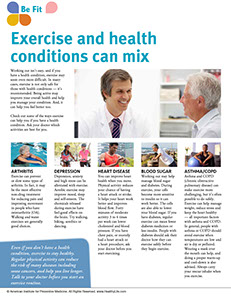SYMPTOM CHECKER
CONDITIONS
Male
Female
Child
Arm, Hand & Shoulder Concerns
Legs & Feet Concerns
Dental & Mouth Concerns
Ear & Nose
Eye Conditions
Head Conditions
Arm, Hand & Shoulder Concerns
Legs & Feet Concerns
Front
Back
Arm, Hand & Shoulder Concerns
Dental & Mouth Concerns
Ear & Nose
Eye Conditions
Head Conditions
Arm, Hand & Shoulder Concerns
Dental & Mouth Concerns
Ear & Nose
Eye Conditions
Head Conditions
Front
Back
Arm, Hand & Shoulder Concerns
Neck Links
Head & Neck Concerns
Arm, Hand & Shoulder Concerns
Neck Links
Head & Neck Concerns
Front
Back
Online Clinic
Wise Healthcare
Exercise & health conditions can mix
Print on Demand
Working out isn’t easy, and if you have a health condition, exercise may seem even more difficult. In many cases, exercise is not only safe for those with health conditions — it’s recommended. Being active may improve your overall health and help you manage your condition. And, it can help you feel better too.
Check out some of the ways exercise can help you if you have a health condition. Ask your doctor which activities are best for you.
Arthritis
Exercise can prevent or slow some types of arthritis. In fact, it may be the most effective non-drug treatment for reducing pain and improving movement in people who have osteoarthritis (OA). Walking and water exercises are generally good choices.
Heart Disease
You can improve heart health when you move. Physical activity reduces your chance of having a heart attack or stroke. It helps your heart work better and improves blood flow. Forty minutes of moderate activity 3 to 4 times per week can lower cholesterol and blood pressure. If you have chest pain, or recently had a heart attack or a heart procedure, ask your doctor before you start exercising.
Depression
Depression, anxiety and high stress can be alleviated with exercise. Aerobic exercise may improve mood, sleep and self-esteem. The chemicals released during exercise have feel-good effects on the brain. Try walking, biking, aerobics or dancing.
Blood Sugar
Working out may help manage blood sugar and diabetes. During exercise, your cells become more sensitive to insulin so it can work better. The cells are also able to lower your blood sugar. If you have diabetes, regular exercise can mean fewer diabetes medicines or less insulin. People with diabetes should ask their doctor how they can exercise safely before they begin exercise.
Asthma/COPD
Asthma and COPD (chronic obstructive pulmonary disease) can make exercise more challenging, but it’s often possible to do safely. Exercise can help manage weight, reduce stress and keep the heart healthy — all important factors with asthma and COPD. In general, people with asthma or COPD should avoid exercise when temperatures are low and air is dry or polluted. Wearing a mask over the mouth can help, and doing a proper warm-up and cool-down is also advised. Always carry your rescue inhaler when you exercise.
Even if you don’t have a health condition, exercise to stay healthy. Regular physical activity can reduce the risk of many diseases including some cancers, and help you live longer. Talk to your doctor before you start an exercise routine.
This website is not meant to substitute for expert medical advice or treatment. Follow your doctor’s or health care provider’s advice if it differs from what is given in this guide.
The American Institute for Preventive Medicine (AIPM) is not responsible for the availability or content of external sites, nor does AIPM endorse them. Also, it is the responsibility of the user to examine the copyright and licensing restrictions of external pages and to secure all necessary permission.
The content on this website is proprietary. You may not modify, copy, reproduce, republish, upload, post, transmit, or distribute, in any manner, the material on the website without the written permission of AIPM.
2021 © American Institute for Preventive Medicine - All Rights Reserved. Disclaimer | www.HealthyLife.com
















































